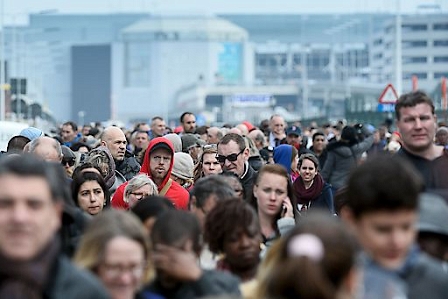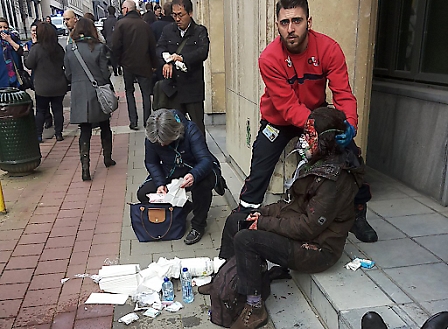Erstellt am: 22. 3. 2016 - 13:25 Uhr
Brussels attacks: Is this the new normal?

AFP PHOTO / Belga / DIRK WAEM
FM4 Reality Check
Listen to the programme in the FM4 Player or subscribe to the podcast and get the whole programme after the show
Dieses Element ist nicht mehr verfügbar
The Belgian capital, Brussels has been rocked by a series of deadly bomb attacks this morning.
Two explosions occured this morning at Brussels airport followed a short time later by another explosion on the Brussels Metro.
Belgium has been on very high alert for months now.
Hal Rock asked security analyst Shashank Joshi, how these attacks could have happened.
SJ: Well, Brussels has been under a very high security level precisely because the threat is so great. They [Islamic State] have sent more people [from Belgium] to fight in Syria and Iraq on a per capita basis than almost any other country in Europe, so they [the Belgian authorities] have a really challenging security environment. Four days ago, of course, they arrested one of the suspects in one of the earlier attacks we saw in Europe, Salah Abdeslam, and that might have prompted other networks to try and accelerate plans for attacks before they could be found, before their networks could be uprooted or given away by Abdeslam. Of course, Belgium is also inside the Schengen Zone, so there’s free movement across Europe. No intelligence agency, particularly in Europe, can monitor all the suspects they have, and I think attacks like these, not only in Belgium, but elsewhere, are absolutely inevitable despite the higher and intensified security threat across the continent.
HR: You touched on it, and I want to go back to it, the timing of all this – so soon after Salah Abdeslam was captured. You said you think it’s people trying to get things done before the net closes in on them, but do you think it could also be retaliation for his capture?
SJ: It’s very difficult to see how a plot of this complexity, particularly in a high security environment like an airport, could really have been retaliation to an event that took place four days ago: the arrest. It seems to me, that something like this would have involved probably weeks of planning, and therefore may have been brought forward in response to the arrest, as a retaliatory gesture, but probably could not have post-dated it.
HR: An airport and a metro station: what do you think was the primary aim here, loss of life or major disruption?
SJ: In a way, neither. The target of these attacks is always publicity and attention, and whatever gets more of that is really the target. I think we have seen a broad shift in tactics away from mostly security targets, away from military related targets, or political ones, which are always very heavily guarded, to soft ones as we particularly saw in Paris, in the attacks on stadia, on cafes, on concert halls, on transport hubs, and hitting many types of targets at once. They cause disruption, they cause loss of life, but more importantly, they also give plenty of opportunities where you can get maximum attention in a very easy way.

AFP PHOTO / Michael VILLA
HR: You say we’ve seen a shift in tactics on the part of the terrorists, are we also seeing a significant and sufficient shift in response by the security forces?
SJ: I think for the Belgians, the fact that so many of the Paris attackers and others originated in Belgium, come from particular suburbs of Brussels, has been a huge wake-up call. The Belgians did not invest enough in their intelligence agency for many, many years, and belatedly they have realized how difficult it is to rebuild some of those old networks. That is now happening, they are ploughing resources in, they are ploughing manpower in, but I think this is a problem to which all of Europe is very slowly adapting.
HR: And is this going to be the new “normal”?
SJ: Absolutely. I think it is. We’re seeing a hugely challenging environment for almost every country that has sent individuals to the battlefields of Iraq and Syria. It’s particularly bad for smaller countries, which have a bigger per capita problem, and perhaps smaller intelligence agencies to rely upon. Belgium, Denmark, some of the Scandinavian countries - these aren’t members of the “5-Eyes” alliance, they don’t have access to US and British intelligence on free flow, and perhaps they have a much bigger challenge relative to the scale of law enforcement, as well. So, it’s a problem for the big countries, Germany, France, Britain, but really, it’s a particularly difficult challenge for the smaller ones. And it’s going to continue for years, because really, the underlying drivers, the strength of ISIS, the chaos in the Middle East, continuing flows of people… these are just not changing.



